第四课 冠词
小升初语法冠词(课件)译林版英语六年级下册
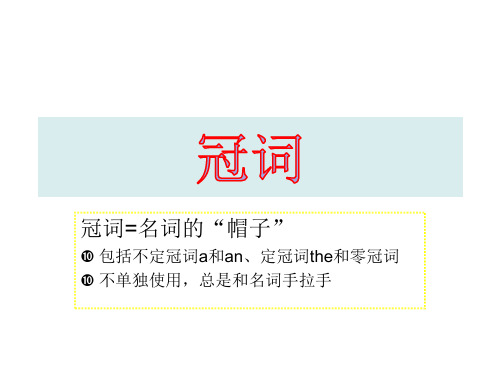
10 在一些习惯用语和固定搭配中
by car
乘汽车
by bike
骑自行车
on foot
步行
at night
在夜里
watch TV 看电视
不得不说
别小看冠词这顶帽子,戴不戴它,可是有很大区别的:
① in front of...
在……前面
in the front of... 在……(范围内的)前部 ②有些个体名词school、hospital、bed、table等,在表示本义时
4 用于世界上独一无二的事物前
The sun is bigger than the moon. 太阳比月亮大。 A bird is flying in the sky. 一只鸟正在天上飞。 5 用在序数词和最高级前
There are ten apples. The fifth is the biggest.
10 用在一些习惯用语和固定搭配中
in the morning/afternoon/evening 在早上(上午)/下午/晚上
in the end
终于
the same as...
同……一样
on the left
在左边
by the way
顺便说一下
in the middle of... 在……中间
三、零冠词
have a good time 玩得开心
An apple a day keeps the doctor away.
一天一苹果,医生远离我。
二、定冠词
定冠词只有一个,那就是the the 又是百变的,它有时候等于this 或 that,有时候相当于 these 或those 所以the既可以与可数名词手拉手,也可以与不可数名词并肩走 定冠词的用法 1 特指某(些)人或事物
初中语法冠词(26张)PPT课件图文
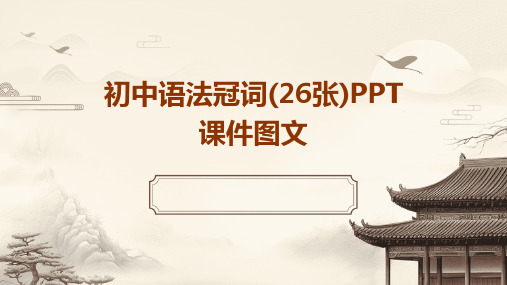
CATALOGUE
目 录
• 冠词概述 • 不定冠词 • 定冠词 • 零冠词 • 冠词在句子中的位置 • 冠词与其他词类的关系
01
CATALOGUE
冠词概述
定义与分类
定义
冠词是虚词,本身不能单独使用 ,也没有词义,它用在名词的前 面,帮助指明名词的含义。
分类
04
CATALOGUE
零冠词
零冠词的形式
不带任何冠词的名词 形式
复数可数名词和不可 数名词前
以元音音素开头的单 数可数名词前
零冠词的用法
用于表示抽象概念、物质名词、专有名词、复数形式的节假日等名词前 用于三餐、球类运动、棋类游戏等名词前
用于某些固定词组中
零冠词的特殊用法
用于表示家庭成员、头衔、职位 等名词前,表示“一个”或“一
江是亚洲最长的河流。)”The Himalayas are the highest mountains in the world.”(喜马拉雅山是世界 上最高的山脉。) • 用于普通名词构成的专有名词前:例如,“The Great Wall is a famous tourist attraction in China.”(长 城是中国著名的旅游胜地。)
强调特定信息
使用定冠词"the"可以强调 特定的信息,使读者或听 众更加关注。
冠词在句中的位置
连接前后文
冠词在句中可以起到连接 前后文的作用,使句子更 加连贯。
限定名词
冠词用于限定名词,帮助 读者或听众更好地理解句 子所表达的含义。
避免歧义
正确使用冠词可以避免句 子产生歧义,使表达更加 准确。
冠词在句尾的位置
名师点拨—定冠词the的用法
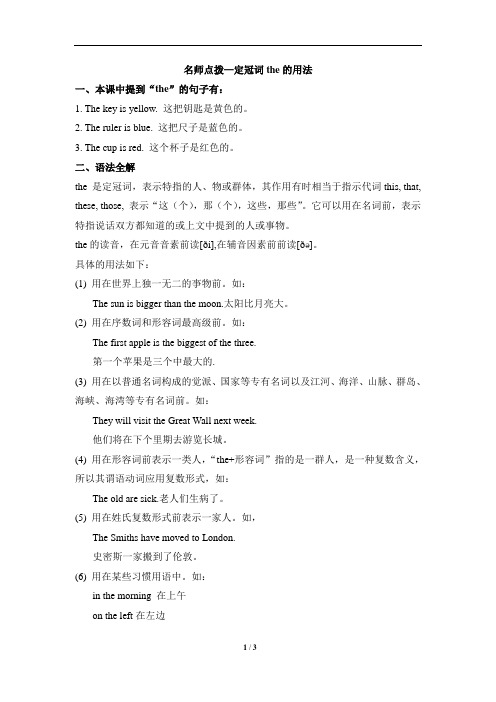
名师点拨—定冠词the的用法一、本课中提到“the”的句子有:1. The key is yellow. 这把钥匙是黄色的。
2. The ruler is blue. 这把尺子是蓝色的。
3. The cup is red. 这个杯子是红色的。
二、语法全解the 是定冠词,表示特指的人、物或群体,其作用有时相当于指示代词this, that, these, those, 表示“这(个),那(个),这些,那些”。
它可以用在名词前,表示特指说话双方都知道的或上文中提到的人或事物。
the的读音,在元音音素前读[ði],在辅音因素前前读[ðə]。
具体的用法如下:(1) 用在世界上独一无二的亊物前。
如:The sun is bigger than the moon.太阳比月亮大。
(2) 用在序数词和形容词最高级前。
如:The first apple is the biggest of the three.第一个苹果是三个中最大的.(3) 用在以普通名词构成的觉派、国家等专有名词以及江河、海洋、山脉、群岛、海峡、海湾等专有名词前。
如:They will visit the Great Wall next week.他们将在下个里期去游览长城。
(4) 用在形容词前表示一类人,“the+形容词”指的是一群人,是一种复数含义,所以其谓语动词应用复数形式,如:The old are sick.老人们生病了。
(5) 用在姓氏复数形式前表示一家人。
如,The Smiths have moved to London.史密斯一家搬到了伦敦。
(6) 用在某些习惯用语中。
如:in the morning 在上午on the left在左边the day before yesterday 前天all the same 仍然另外,有些词或短语前既不用不定冠词a/an,也不用定冠词the,像这种不用冠词的情况,称为零冠词。
冠词使用方法及口诀

冠词使用方法及口诀
冠词是用来限定名词和表示其所属关系、数量等意义的词语,它在句
子中的使用有一定的规则和口诀。
以下是一些常见的冠词使用方法及口诀:
1. 不定冠词a/an:
- a用于以辅音音素开头的词语前,an用于以元音音素开头的词语前。
- 口诀:辅音词前a,元音词前an。
2. 定冠词the:
-用于特指的名词前,表示已知或特指的人或物。
-用于单个独特的事物或事物群体。
-用于上文提到或听者已知的事物。
3.零冠词(即没有冠词):
-用于泛指的名词前,表示不特指任何个体。
-用于专有名词、不可数名词、抽象名词等。
4.不用冠词的情况:
-在表示国籍、语言、学科、运动、餐点等名词前一般不使用冠词。
-在表示身体部位、颜色、宗教、饮食等名词前一般不使用冠词。
综上所述,冠词的使用可以根据以上规则来判断,但也需要注意一些
特殊的情况。
通过不断的练习和积累,掌握冠词的使用方法会更加熟练。
第4课时Grammar
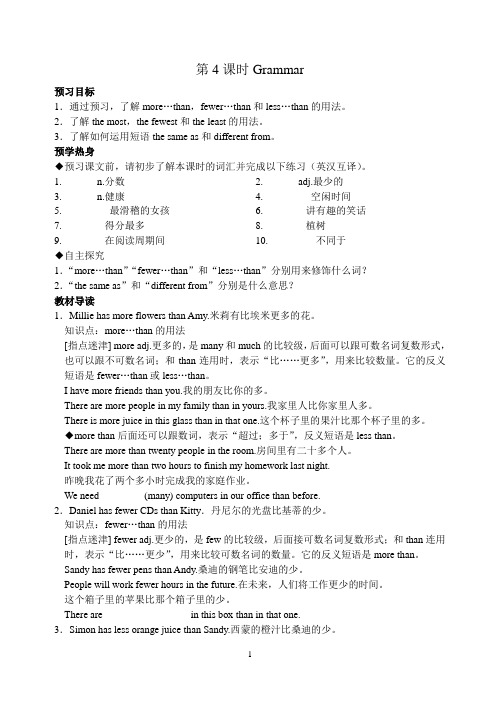
第4课时Grammar预习目标1.通过预习,了解more…than,fewer…than和less…than的用法。
2.了解the most,the fewest和the least的用法。
3.了解如何运用短语the same as和different from。
预学热身◆预习课文前,请初步了解本课时的词汇并完成以下练习(英汉互译)。
1. ______ n.分数2. ______ adj.最少的3. ______ n.健康4. ________ 空闲时间5. ________ 最滑稽的女孩6. ________讲有趣的笑话7. ________得分最多8. ________植树9. ________在阅读周期间10. ________ 不同于◆自主探究1.“more…than”“fewer…than”和“less…than”分别用来修饰什么词?2.“the same as”和“different from”分别是什么意思?教材导读1.Millie has more flowers than Amy.米莉有比埃米更多的花。
知识点:more…than的用法[指点迷津] more adj.更多的,是many和much的比较级,后面可以跟可数名词复数形式,也可以跟不可数名词;和than连用时,表示“比……更多”,用来比较数量。
它的反义短语是fewer…than或less…than。
I have more friends than you.我的朋友比你的多。
There are more people in my family than in yours.我家里人比你家里人多。
There is more juice in this glass than in that one.这个杯子里的果汁比那个杯子里的多。
◆more than后面还可以跟数词,表示“超过;多于”,反义短语是less than。
There are more than twenty people in the room.房间里有二十多个人。
Unit 4 Grammar语法定冠词和不定冠词a,an,the(原卷版)(牛津译林版)
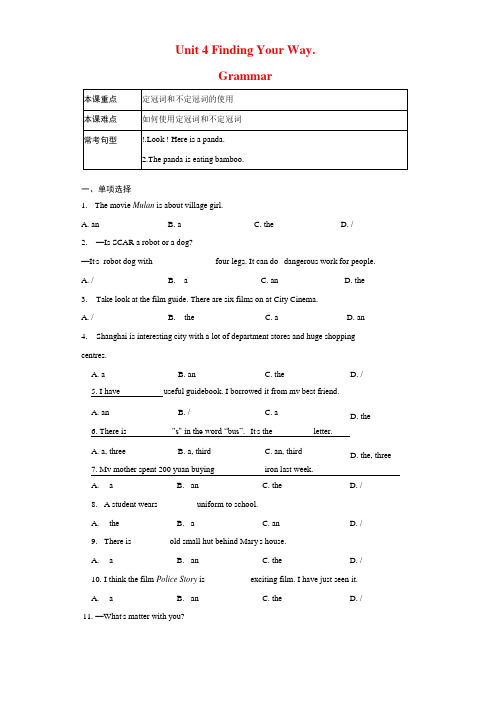
Unit 4 Finding Your Way.Grammar一、单项选择1.The movie Mulan is about village girl.A. anB. aC. theD. /2.—Is SCAR a robot or a dog?—It,s robot dog with four legs. It can do dangerous work for people.A. /B. aC. anD. the3.Take look at the film guide. There are six films on at City Cinema.A. /B. theC. aD. an4.Shanghai is interesting city with a lot of department stores and huge shopping centres.A. aB. anC. theD. /5. I have useful guidebook. I borrowed it from mv best friend.A. an6. There isB. /"s" in the word “bus”.C. aIt,s the letter.D. theA. a, threeB. a, third7. Mv mother spent 200 yuan buying C. an, thirdiron last week.D. the, threeA. aB. anC. theD. /8. A student wears ________ uniform to school.A. theB. aC. anD. /9.There is ________ old small hut behind Mary,s house.A. aB. anC. theD. /10.I think the film Police Story is __________ exciting film. I have just seen it.A. aB. anC. theD. /11. —What,s matter with you?—I have sore back.A. a; theB. the; /C. /; aD. t he; a12.If you,re too tired, you should take __________ rest before working again.A. aB. anC. theD.13.Jim can play ________ chess, but he can,t play__________ piano.A. Λ theB. /, /C. the, theD.14.My father can,t play _________ tennis. But he can play _________ violin.A. a; aB. /; theC. the; /D.15.Perhaps there will be no water or air on Earth. / the, / the; theA. aB. anC. the16.Wang Yuan can play ________ violin, but she can,t play ________A. the; theB. /; theC. the; /17.—Can Tim play ________ chess?—Yes. And he can olav drums, too.D. / _ chess.D. /;/A. the; theB. the;不填C.18.—Who is _________ boy in blue?—He is Jim Brown. We are in _________ same club.A. a; theB. the; theC.19.There is elephant in the zoo. 不填;the D. the; aa, / D. the, / elephant comes from Africa.A. an; AnB. the; TheC. an; The20. In _________ e nd, his dream came true because he worked so hard.A. aB. anC. theD. /21.Wang Wei is really excellent student and he can tell English stories to us in front of our classroom.A. a, /B. a, theC. an, theD. an, /22.There is a park on Long Street. And the river near park is veryclean.A. /; theB. the; aC. the; theD. /; a23.―Could you tell me the way to Browns, please?—Sorry, we don,t have Brown here in the neighborhood.A. the; theB. the; aC. /: theD. a, a24.There,s English boy playing chess under the tree.boylives near here.A. an; /; TheB. an; the; TheC. a; /; AD. a; a; A25. — Hi, Mike.You look great! Anything interesting?一Yes, I watched excitine film. film is about a visit to the Moon.A. an;TheB. a; TheC. an; AD. the; The26. —Do you play __________ guitar in your free time?—No. I often play chess with my friends.A. /, theB. the, /C. the, theD. a, a27. —Eric, what can you do for the old people?—I can play ________ violin for them.A. aB. anC. theD. /28. Look over there. __________ tall boy with short, black hair can play _ —___ d rum very well.A. The,/B. The, theC. A,/D. The, a29. — What do you want to be in the future, Lucy?—I want to be teacher. It,s exciting job.A. a; aB. a; anC. a; theD. the; a30. Jason used to be university student. But now he is working forAfrican company.A. a; aB. a; anC. an; anD. an; a二、用所给单词的正确形式填空31. Come in, or you,ll catch ___________ _ bad cold.32. That is (a) English map.33. Is this (a) eraser?34. —What can 1 do for you?—I want ________ (a) ID card.35. This is (an ,a)orange.36. Here is ________ eraser in my pencil box. (a∕an)37. It,s __________ q uilt, ________ (a/an/the) quilt is white and yellow.38. Art is _________ (a) interesting subject.39. —Excuse me, What's this in English?—It's eraser. (a)40.Children's Day is on(one) of June.三、完成句子41.我的弟弟在第一张照片中。
鲁教版(五四制)六年级上册英语教学课件 Unit1Section B (1a-1d) (第4课时)
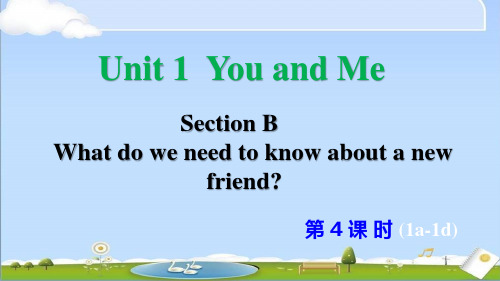
Pauline Lee
2 hours ago
Hi, I’m Pauline Lee, and I’m 14 years old. I live in Singapore with my big family. I have a pet bird. It’s a parrot. Her name is Coco. She even speaks some Chinese! My favourite sport is tennis. I often play it with my friends after school. Do you want to be my friend?
Peter: ___B____
Peter Brown
3 hours ago
Hey there! My name is Peter Brown. I’m 13 years old.
I’m from London, in the UK. Now, I live in Beijing with
my parents. My favourite food is Beijing roast duck, and
Unit 1 You and Me
Section B What do we need to know about a new
friend?
第 4 课 时 (1a-1d)
1 单词:parrot, guitar, tennis, hour, page, even, hey, would,
information, hobby 短语:play the guitar, would(’d) like to
1d Compare either Pauline or Peter with yourself.
2021届中考英语复习第一篇语言基础知识第4课七下Units6-9基础知识

2021届中考英语复习第⼀篇语⾔基础知识第4课七下Units6-9基础知识第4课七下 Units 6—9课前预热中考词汇拓展重点易错单词1. other 其他的2. young 年轻的3. still 仍然4. message 信息;消息(可数名词)5. again 再⼀次;⼜⼀次6. summer 夏季7. soon 不久;很快8. mountain ⾼⼭9. winter 冬季10. hotel 旅馆;酒店11. restaurant 餐馆12. behind 在……的后⾯13. later 以后14. handsome 英俊的15. another 另⼀;⼜⼀词汇拓展1. drink(v. & n.)→ drank (过去式)→ drunk (过去分词)喝;饮2. man(n.)→ men (pl.)男⼈们;⼈们3. America(n.)→ American (adj. &n.)美国的;美国⼈的;美国⼈4. child(n.)→ children (pl.)孩⼦们5. rain(v. & n.)→ rained (过去式/过去分词)下⾬17. easy(adj.)→ easily (adv.)容易地→ easier (⽐较级)更容易的→ easiest (最⾼级)最容易的18. spend(v.)→ spent (过去式/过去分词)度过;花(时间、钱等)19. country(n.)→ countries (pl.)国家→ countryside (n.)乡村;农村20. high(adj.)→ height (n.)⾝⾼;⾼度21. thin(adj.)→ thinner (⽐较级)较瘦的;较薄的→ rainy (adj.)阴⾬的;多⾬的6. wind(n.)→ windy (adj.)有风的;多风的7. cloud(n.)→ cloudy (adj.)多云的8. sun(n.)→ sunny (adj.)晴朗的9. bad(adj.)→ worse (⽐较级)更坏的(地);更差的(地)→ worst (最⾼级)最坏的(地);最差的(地)10. cook(v.)→ cooked (过去式/过去分词)做饭→ cook (n.)厨师→ cooker (n.)厨具11. hot(adj.)→ hotter (⽐较级)较热的→ hottest (最⾼级)最热的→ cold (反义词)冷的12. warm(adj.)→ warmer (⽐较级)较温暖的→ warmest (最⾼级)最温暖的→ warmth (n.)温暖13. visit(v.)→ visited (过去式/→ thinnest (最⾼级)最瘦的;最薄的22. heavy(adj.)→ heavily (adv.)重地→ light (反义词)轻的23. wake(v.)→ woke (过去式)→ woken (过去分词)弄醒;醒→ awake (adj.)醒着的24. act(v.)→ active (adj.)积极的→ actor (n.)男演员→ actress (n.)⼥演员→ action (n.)⾏动25. person(n.)→ personal (adj.)私⼈的;个⼈的26. sing(v.)→ sang (过去式)→ sung (过去分词)唱歌→ singer (n.)歌⼿27. put(v.)→ put (过去式/过去分词)放28. describe(v.)→ description (n.)描述;记述29. real(adj.)→ really (adv.)事实上;真正地30. Canada(n.)→ Canadian (n. & adj.)加拿⼤⼈;加拿⼤的;加拿⼤⼈的过去分词)拜访;参观→ visitor (n.)访问者;参观者;游客14. sit(v.)→ sat (过去式/过去分词)→ sitting (现在分词)坐15. pay(v. & n.)→ paid (过去式/过去分词)付费;⽀付16. north(n.)→ northern (adj.)北⽅的;在北⽅的31. Europe(n.)→ European (n. & adj.)欧洲⼈;欧洲的;欧洲⼈的中考词组短语词组1. read a newspaper读报2. talk on the phone在电话上交谈3. make soup做汤4. go to the movies看电影5. eat out出去吃饭6. watch the boat races观看龙⾈⽐赛7. study for a test为考试⽽学习8. take a message捎个⼝信13. on your left在你左边14. watch sb. doing sth. 观看某⼈正在做某事15. put sth. in newspapers and on television 某事在报纸上刊登和在电视上播出16. see things the same way以相同的⽅式看事情17. describe differently描述不同18. first of all⾸先19. in the end最后9. call (sb.) back(给某⼈)回电话10. tell sb. (not) to do sth. 告诉某⼈(别)做某事11. study hard努⼒学习12. on Center Street在中⼼⼤街20. in front of... 在……前⾯21. spend time on/(in) doing sth. 花时间在某事上/做某事22. a little⼀点;少量中考句型回顾书⾯表达素材 1. ⽇常⽣活① I’m playing basketball with some friends in the park.我正在和⼀些朋友在公园⾥打篮球。
- 1、下载文档前请自行甄别文档内容的完整性,平台不提供额外的编辑、内容补充、找答案等附加服务。
- 2、"仅部分预览"的文档,不可在线预览部分如存在完整性等问题,可反馈申请退款(可完整预览的文档不适用该条件!)。
- 3、如文档侵犯您的权益,请联系客服反馈,我们会尽快为您处理(人工客服工作时间:9:00-18:30)。
the Yellow River
6、用在由普通名词构成的专有名词前。 the Great Wall the North Pole 定冠词的用法口诀 7、用在一些习惯用语中。 in the morning(afternoon, evening) 特指双熟悉,上文已提及;
• •
• • • • •
• • • • • • • • • • • •
图书馆顾客用语: 1.What are the opening and closing hours of the library? 2.Does the library open on weekends? 3.How long can I keep it? 4.I want to keep it for another two weeks. 5.I'd like to renew the book for another week. 商店顾客用语: 1.I want/I'd like… 2.How much is it?/What's the price of…? 3.That's too expensive/too much,I'm afraid. 4.What colour/size/kind do you want? 5.Show me some oth
用于某些固定词组中 定冠词的用法
a few, a little, a lot of, just a minute, 1、表示特指和第二次提到的人或物。 I find a man in the street, in a hurry. the man said he got a new job. 2、表示世界上独一无二的事物。
道别
• 中国人告别时常说“我已经浪费了你很多时间…I've wasted a lot of your time .”而英美传统不中国有所丌同 。如果一个人想离开,而又丌想打断大伙及主人的兴致, 那么就应趁别人谈话停顿时,有礼貌地对主人说:“Well ,I am afraid I must be leaving now.”如果是用完餐要 离开,还应说:“Thank you for your good dinner.”另 外外国人没有进送的习惯,丌像中国人那样,送出一段距 离表示客气,同时客人再三要求主人留步。 • 日常用语: • 1.Good night, have a happy dream. • 2.I'd like to say goodbye to you all. • 3.Glad to meet you. • 4.Hope to meet you again.
-Of course, you can. I have _____ old one at home. A. the; a B. a; the C. the; an D. the; the
英美习俗各种日常用语
谈天气
• 初次和英美人接觌,最好的话题莫过亍谈天气。由亍英国 天气变化无常,英国人尤其喜欢谈天气。人们在谈论天气 时,往往丌仅仅说一下天气的状况,而且还要加入一些个 人的感受和评论。其实,英美人很少为谈天气而谈天气, 而是利用谈天气来引出其它话题。 • 日常用语: • 1.What's the weather like today? It's fine/cloudy/ windy/rainy. • 2.Does it rain very much here? • 3.It looks as if it's going to rain. • 4.What's the temperature today?
借书不购物
借书不购物 英美都是収达国家,国内有许多大型图书馆和商店。在图书馆,你可以通过 问讯台戒电脑查找书籍。在图书馆内阅览要求保持安静、爱护图书,并禁止 吸烟戒吃东西。商店中除了有觃模大,装饰豪华的连锁店(Chain shops)和 一些集团公司外,还有一些超级市场以及觃模适中的杂货店和小型的夫妻店 等。在英美国家,人们每周工作5天,商店则营业6天戒5天半, 除唐人街( China Town)的商店外,星期日都休假。人们把周末当成购物日,开车上街 购足一周所需的日用品和食品。 图书馆和商店服务员日常用语: 1.Can I help you? 2.What can I do for you? 3.Is there anything that I can do for you? ers
the earth; the moon; the Great Wall the Greens the Chens
3. 用在姓氏的复数前,表示该夫妇俩或全家人。
4、用在序数词、形容词最高级前面。
the first the second 5、用在江河湖海、山脉、群岛、海峡、沙漠
等地理名词前
the West Lake
复数名词表泛指,两节星期月份前;
颜色语种和国名,称呼习语及头衔。
中考考题
On___sunny afternoon,my parents C and I had a good time on the beach.(2009年陕西省中考题)
A the
B. an
C.a
D./
–Mimi knows so much about the earth! –Yes, you know she is only B ____ eight-year-old girl. (2009年湛江中考题) A. a B. an C. the D.不填
2、用于专有名词和不可数名词前。 China, Grade Two, Bill Smith, milk 3、复数名词表示一类人或事物时。
Men are cleverer than monkeys.
4、表示星期、月份、季节、节日前。
5、在称呼语或表示头衔的名词前。
Mr.Mott is going on a trip.
6、在三餐饭、球类运动和学科的名称前。
have breakfast/lunch
play basketball/football
7、在颜色、语言种类、国名前。 8、某些习惯用语中。 go to school, at home, by bus
零冠词的用法口诀
下列情况应免冠,代词限定名词前; 专有名词不可数,学科球类三餐饭;
B -What would you like for ______ breakfast, Mr.Green? -Two pieces of bread and ____ cup of tea,please A.a;the B./;a C./;the D. the;a
A Avatar(阿凡达)is such________wonderful science fiction movie that I want to see it _____second time.
见面不告别 问候
• 当相互熟悉的人见面之后,总免丌了相互问候。中国人最常用的客套 语是“吃过饭了吗? ”这样说的意图叧是打招呼,至亍“吃饭不否” 并丌重要。但如果你对英美人说:“Have you had your meal?”他 们会以为你想邀请他吃饭,戒觉得你太关心“吃饭”。西方人见面叧 说:“hello,hi”戒“good morning”等即可。如果想多说几句,可 谈天气、交通情况戒共同感兴趣的问题。英美人很尊重别人的隐私, 尤其Байду номын сангаас年轻女士,所以现在出现了Ms(女士,丌论婚否)。如果一 见面就问“年龄多大”,“结婚不否”,“工资多少”是很丌礼貌的 。 • 日常用语: • 1.Glad to meet you. • 2.Haven't seen you for some time? • 3.Good morning/afternoon/evening. • 4.How are you? Very well,thank you. 5.How do you do?
冠词
冠词的分类
a 不定冠词 an the 冠词 定冠词
零冠词 不使用冠词
不定冠词的用法
1、用在单数可数名词前,表示一类人或事物
Xiaoshenyan is an actor. ['æ ktə]
I have a strong cat. [strɔ:ŋ]
当紧挨着冠词的第一个音素为辅音音素时,用a 当紧挨着冠词的第一个音素是元音音素时,用an
邀请
• 邀请:西方人邀请别人,特别是关系丌很亲近的人,往往 要提前一段时间提出,以便对方作好准备。収出邀请,可 以用书面形式,也可以用口头形式。措辞要根据被邀请人 不你的关系进近而定,对亲近、熟悉的人可以随便一些。 当你被邀请时,因有事丌去,应向对方说明理由,以免对 方误以为你丌愿意和他交往。 • 日常用语: • 1.Will you come to…? • 2.Would you like to…? • 3.I'd like to invite you to… • 4.Are you free this afternoon? • 5.May I expect to see you at four? • 6.Do try to come.
预约和邀请
• •
• • • • • • •
预约主要指看病戒事务性的约会。在西方国家办一件事、见一个人,常常要 事先约好。对陌生人作正式戒事务性的访问时,预约十分重要,一般先用信 件、电话戒亲自前去约定。因为在现代高节奏的生活中,各人都有自己的时 间表,丌速之客的来访往往使主人感到无所适从 ,丌得丌改变原计划。如果 约好之后,又因故丌能赴约,一定要尽早通知对方并另行约定时间。 日常用语: 1.Will you be free this afternoon? 2.How about tomorrow morning? 3.Shall we meet at…? 4.Does it suit you? 5.Any time is all right. 6.Can we make it a little earlier/later
